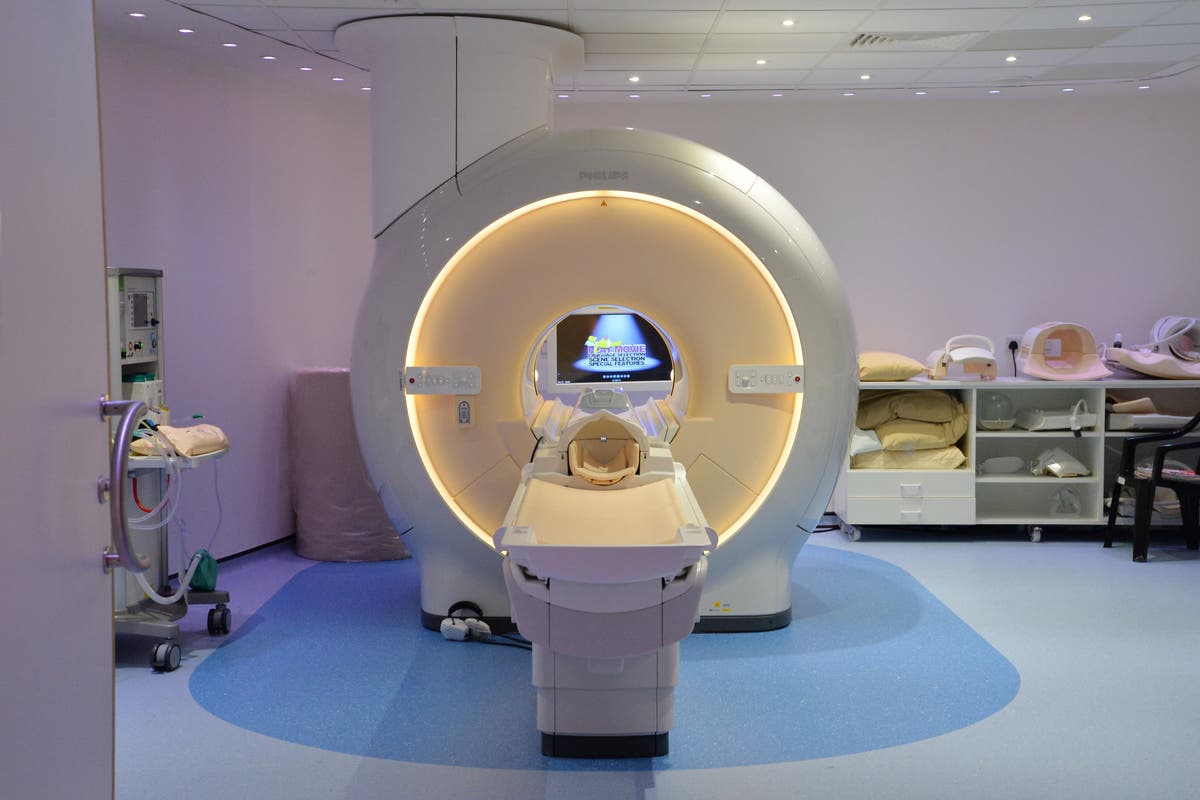Altering how MRIs are carried out may triple the variety of scans used to detect prostate most cancers, probably making prognosis faster and simpler, researchers have stated.
MRI scans are customary for males suspected of getting the illness and may permit medical doctors to rule out most cancers with out the necessity for a tissue biopsy, however demand has risen sharply.
The scans are at present carried out in three phases, with imaging carried out with out distinction within the first occasion.
After this, the affected person is injected with an iodine-based liquid fed into the physique by a cannula, which helps improve scan pictures.
When it comes to impression, we are going to see an enormous distinction to prostate most cancers detection for little or no effort and price
Dr. Alexander Ng
Researchers from College School London (UCL) and College School Hospital (UCLH) stated a two-step MRI, with out the necessity for injection, may be “simply as efficient”.
Dr Alexander Ng, of the UCL Division of Drugs and first writer of the examine, stated: “The standard of MRI scans may be considerably improved by following a couple of easy suggestions. This may very well be altering the period of sure sequences by a couple of seconds, for instance.
“When it comes to impression, we are going to see an enormous distinction to prostate most cancers detection for little or no effort and price.”
The UCL-led PRECISION examine, revealed in 2018, developed a five-point scoring system to charge MRI picture high quality, 5 being optimum for prognosis.
To attempt to overcome present capability points with MRIs for prostate most cancers, they’ve now arrange the PRIME trial to discover whether or not a shorter and cheaper MRI scan may turn into the brand new customary of care.
The most recent examine – GLIMPSE – types a part of the trial.
For the primary section of GLIMPSE, researchers analysed 355 MRI scans from 41 medical centres throughout 18 international locations.
Some 32% had achieved the very best PI-QUAL rating of 5.
The crew contacted every centre and when 36 from 17 international locations resubmitted MRIs, the rating rose to 97%.
Dr Ng added: “The fantastic thing about our examine is that we now have offered a glimpse into the worldwide high quality of MRI scanners, and located that solely a 3rd of scanners have been of optimum diagnostic high quality.”
The long-term aim of our work on prostate most cancers screening is to see whether or not we will successfully diagnose or rule out most cancers utilizing a shorter, cheaper MRI scan
Veeru Kasivisvanathan
The findings from GLIMPSE, revealed within the journal Radiology, will feed immediately into the PRIME trial.
If profitable, researchers stated it may “change scientific follow”, reducing MRI scan instances from half-hour to twenty minutes on common.
The scans would additionally require fewer workers and could be much less invasive as they’d not require intravenous distinction injections.
Veeru Kasivisvanathan, affiliate professor within the UCL Division of Surgical procedure and Interventional Science, and a senior writer of the examine, added: “The long-term aim of our work on prostate most cancers screening is to see whether or not we will successfully diagnose or rule out most cancers utilizing a shorter, cheaper MRI scan.
“There may be rising consciousness amongst most cancers specialists that variable high quality of MRI scans poses a problem to this method, therefore the outcomes of the GLIMPSE examine are an essential step in direction of making MRI imaging as fast, low cost and efficient as doable.”
Not solely will this assist the researchers, however it means enormous numbers of males worldwide will likely be getting a greater and extra correct prognosis
Dr Hayley Luxton
The PRIME and GLIMPSE research are funded by Prostate Most cancers UK and The John Black Charitable Basis by a Travelling Prize Fellowship Award, the European Affiliation of Urology Analysis Basis and the Dieckmann Prostate Most cancers Analysis Basis.
Dr Hayley Luxton, senior analysis impression supervisor at Prostate Most cancers UK, stated: “Multiparametric MRI (mpMRI) scans have reworked how we diagnose prostate most cancers, giving males a extra correct prognosis and serving to keep away from pointless biopsies.
“Nevertheless it may also be time consuming and generally uncomfortable, because it entails a number of pictures and requires males to have an injection. That’s why, with The John Black Charitable Basis, we co-funded the PRIME trial to see if it may very well be simply as efficient with fewer pictures and with out the jab.
“What we didn’t anticipate was that it will have such an enormous impression on how hospitals across the globe take mpMRI pictures.
“This unbelievable enhance in what number of are producing the best-quality pictures is all due to the data and assist shared by the world-leading crew at UCL and we’re proud that our funding has helped convey this about.
“Not solely will this assist the researchers, however it means enormous numbers of males worldwide will likely be getting a greater and extra correct prognosis.”




![Download Love Is Blind (Season 1 – 5) [S05E10 Added] Dual Audio [Hindi + English] Complete Netflix Series 720p [350MB] WEB-DL review 3 Love Is Blind](https://newswind.co.uk/wp-content/uploads/2023/10/Love-Is-Blind-150x150.jpg)




